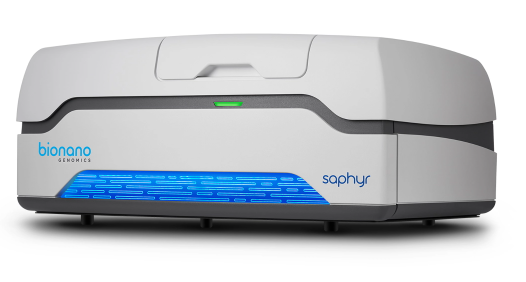1000x resolution of a typical karyotype
Through our services laboratory, you can execute a project to analyze samples with OGM, a method that detects genome-wide structural variations in an unbiased manner and at much higher sensitivities than sequencing-based technologies and current cytogenetic techniques.
During an OGM data services project, you’ll work with our team to have OGM and initial structural variant analysis performed in our laboratory on a sample set of your choosing. We’ll work together to understand your research question, define your needs, and build a project that will deliver the answers you want. At the end of the project, we share raw molecules data, assemblies and annotated structural variant (SV) calls, provide training on our proprietary visualization software, and allow exports to a variety of file formats (including VCF files) that let you compare and combine OGM results with other data types, like sequencing and array.

Several analysis options are available from Bionano Laboratories depending on the sample types, resolution required, and key research questions. The table below summarizes general guidance by application type, but we are happy to customize a study design to your needs.
| APPLICATION | germline dna analysis | cancer analysis | cell line or other mosaic samples |
|---|---|---|---|
| Data collected | 400 Gbp | 1.5 Tbp | 5 Tbp |
| Coverage setting | 100x | 400x | 1600x |
| Effective coverage | 80x | 300x | 1200x |
| Variant allele frequency | 50% | ≥5% | ≥1%* |
| Analysis pipeline | De novo assembly | Rare variant analysis | Rare variant analysis |
| Performance (size) by variant type** | |||
| Insertions | >500 bp | >5 kbp |
Inquire for more information. |
| Deletions | >700 bp | >7 kbp | |
| Stable Repeat Expansion/Contractions | >500 bp | >5 kbp | |
| Duplications | >30 kbp | >150 kbp | |
| Translocations | >70 kbp | >70 kbp | |
| Inversions | >30 kbp | >70 kbp | |
Structural variants called against GRCh37/hg19 or GRCh38/hg38 will be filtered against a control database or gene list of choice based on the project goals. Dual or trio variant annotation can be run for various applications. These include identifying de novo or inherited variants in germline samples, somatic variants in matched tumor-control samples, and targeted structural variants in edited versus unedited control cell lines. Just indicate the relationship between samples in the intake form.
Learn more about each step of a services project, read through FAQs, and find out what’s required to begin your project with us.
Let’s Get Started